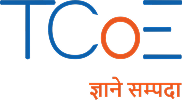EV Motors Technician Course
As the automotive industry undergoes a historic shift toward sustainable mobility in 2025, the EV Motors Technician Course offers a high-impact gateway into the future of transportation. This course is specifically designed to transform traditional mechanical skills into specialized expertise in electric vehicle (EV) powertrains, where the electric motor is the “heart” of the machine.
- 72 Hours (2 hours/day x 6 days/week x 6 weeks) OR at your own pace
- Hindi, English
- Learn & Get Certified
- Basic & Intermediate
- Hands-On Training
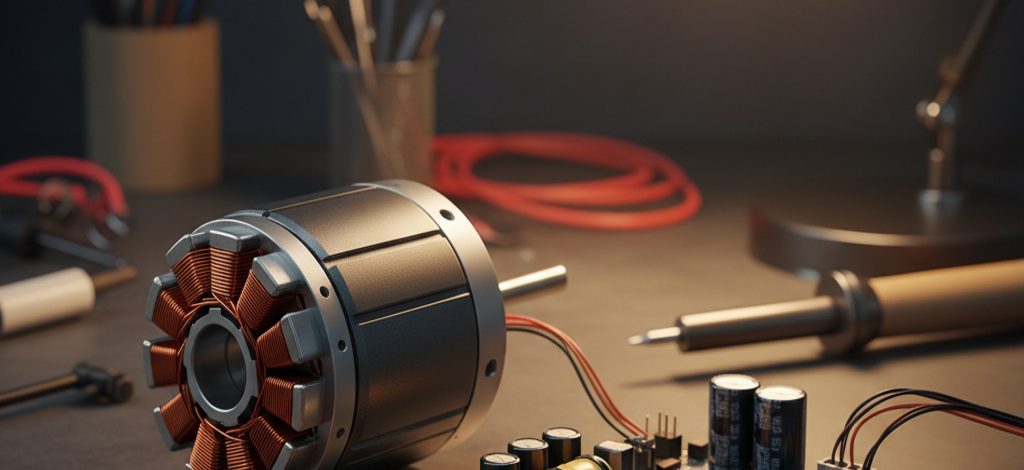
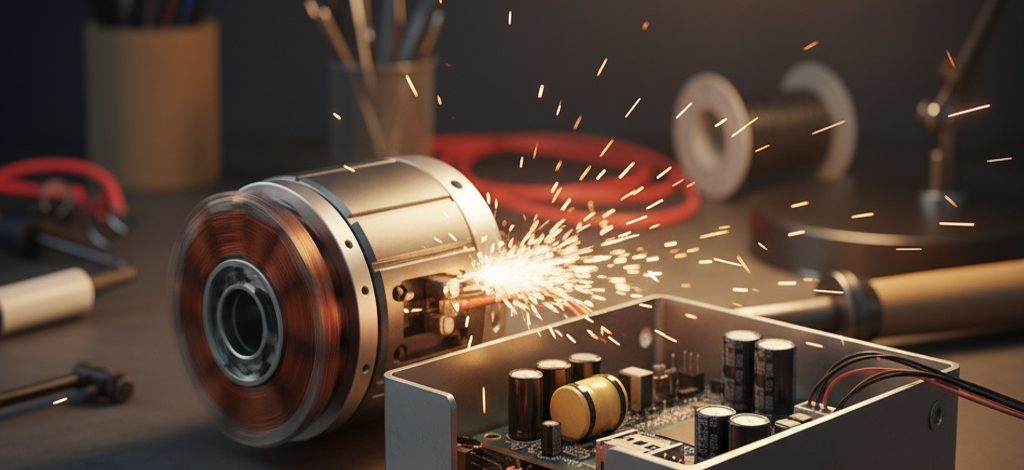
Online Course Fees
Offline Course Fees
About this course
EV Motors Technician Course introduces the principles, types, and applications of electric motors along with the control systems that drive them. The course covers DC, induction, and brushless motors, along with motor controllers, power electronics, and control strategies for speed, torque, and efficiency. Students will gain both theoretical knowledge and practical insights into selecting, operating, and integrating motors and controllers for applications in electric vehicles, robotics, and industrial automation.
This course provides essential knowledge and practical training to build industry-relevant skills.
- Online Course Fees: ₹5000, ₹4500 (incl. GST) (Excluding tools & equipment cost)
- Offline Course Fees: ₹13500, ₹12000 (incl. GST) (Excluding tools & equipment cost)
- Certification: TCoE
- Duration: 72 Hours (2 hours/day x 6 days/week x 6 weeks) OR at your own pace
What you'll learn
After this course you will learn:
- Fundamentals of Electric Motors: – Understand how electric motors convert electrical energy into mechanical motion.
- Types of Motors: Learn about DC, BLDC, PMSM, and induction motors commonly used in EVs and industrial systems.
- Motor Working Principles: Explore torque generation, speed control, and efficiency characteristics of different motor types.
- Introduction to Motor Controllers: Study how controllers manage motor speed, torque, and direction through electronic control systems.
- Motor-Controller Integration: Learn how to pair motors with suitable controllers for optimal performance and reliability.
- Control Techniques: Understand PWM control, regenerative braking, and field-oriented control (FOC) methods.
- Testing and Troubleshooting: Gain hands-on experience diagnosing motor and controller faults using tools and diagnostic data.
- Thermal and Safety Management: Learn how to protect motors and controllers from overheating, short circuits, and overloads.
Course Content
Why take this course?
This course equips you with specialized skills to inspect, test, maintain, and repair electric motors used in electric vehicles. You will learn about motor types, operating principles, controllers, cooling systems, fault diagnosis, and performance testing. As electric motors are a core component of EV powertrains, skilled motor technicians are in high demand across manufacturing, service, and fleet operations. This course prepares you for job-ready technical roles, ensuring reliable motor performance and supporting the rapid growth of electric mobility.
How to use online TCoE platform?
Tools and Equipment required
National Skill Development Mission
Module-1: Introduction to EV and EV market
- This module provides an overview of electric vehicles (EVs) and their growing role in modern transportation.
- It introduces the basic structure of EV systems, highlighting the importance of motors and motor controllers in vehicle performance.
- The module also explores global and Indian EV market trends, key drivers of adoption, and future opportunities, giving learners a clear understanding of the industry landscape and the demand for skilled professionals in this field.
Module-2: Introduction of equipment and tools used
- This module introduces learners to the essential tools and equipment required for working with motors and motor controllers.
- It covers hand tools, multimeters, oscilloscopes, power analyzers, torque meters, and safety devices commonly used in testing and troubleshooting.
- Students will learn proper handling, usage, and safety practices, building a strong foundation for hands-on work with motor and controller systems.
Module-3: Motor Fundamentals
- This module introduces learners to the basic principles of electric motors, including their construction, working, and classifications such as DC, BLDC, and induction motors.
- It covers key parameters like torque, speed, efficiency, and power characteristics, along with their role in electric mobility.
- By understanding these fundamentals, students will build the foundation needed to analyze, select, and operate motors effectively in various applications.
Module-4: DC and BLDC Motors
- This module explores the working principles, structure, and applications of DC and Brushless DC (BLDC) motors.
- Learners will understand their differences in design, performance, and control methods, along with key aspects like efficiency, torque-speed characteristics, and maintenance requirements.
- The module also highlights why BLDC motors are widely preferred in modern electric vehicles and automation systems, equipping students with the knowledge to evaluate and apply both motor types effectively.
Module-5: Motor Controllers
- This module introduces motor controllers, the key electronic systems that regulate the speed, torque, and direction of motors.
- Learners will explore the different types of controllers used with DC and BLDC motors, their working principles, and control strategies such as PWM (Pulse Width Modulation).
- The module also covers protection features, efficiency optimization, and real-world applications in electric vehicles, robotics, and industrial automation.
- By the end, students will understand how controllers act as the “brain” of motor operation.
Module-6: Motor and Controller assembly
- This module guides learners through the practical assembly of motors and their corresponding controllers.
- It covers mounting motors, connecting power and control circuits, wiring sensors, and integrating controllers with power sources.
- Emphasis is placed on proper alignment, secure connections, safety practices, and testing during assembly.
- By the end of this module, students will gain hands-on experience in building a fully functional motor-controller system ready for operation.
Module-7: Testing and Repair
- This module focuses on evaluating the performance and reliability of motors and controllers.
- Learners will explore methods for testing voltage, current, torque, speed, and signal integrity, as well as identifying common faults in motors and controllers.
- The module also covers troubleshooting techniques, safety precautions, and repair practices, enabling students to maintain, diagnose, and restore motor-controller systems to optimal working condition.
ENROLL TODAY & GET 30% OFF ON ALL COURSES
Your Future Can’t Wait, Enroll Now and Save 30% On All Courses.
Related Courses
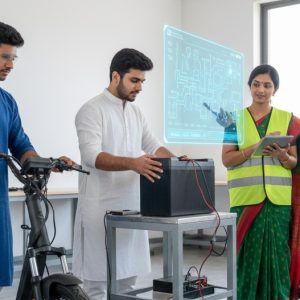
EV Scooter Technician

EV 3-Wheeler Technician
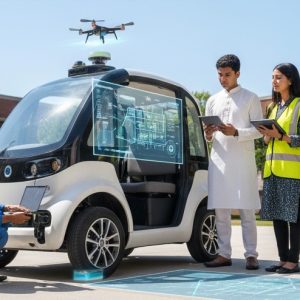
Electric Vehicles Engineer
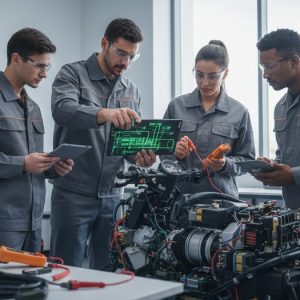
EV Fault Diagnostics Technician
See what our students have to say
With over a decade of experience, our mission is to produce future-ready skilled resources.
Motor Speed and Torque Control Techniques
This topic focuses on how motor controllers regulate the speed and torque of electric motors to achieve smooth and efficient performance in electric vehicles and automation systems. Learners explore advanced control methods such as Pulse Width Modulation (PWM), Field-Oriented Control (FOC), and regenerative braking. The topic also covers how controllers respond to varying load conditions, optimize power usage, and enhance motor lifespan. Mastering these techniques enables students to design, tune, and troubleshoot high-performance motor systems used in EVs, robotics, and industrial drives.
Job Opportunities
Here are some interesting job opportunities after completing the Motors and Motor Controllers course:
Motor Design Engineer – Work on designing efficient electric motors for EVs, robotics, and industrial systems.
Motor Control Engineer – Develop and optimize motor control algorithms to enhance speed, torque, and efficiency.
Motor Testing and Maintenance Technician – Perform testing, diagnostics, and preventive maintenance on various motor systems.
EV Powertrain Engineer – Specialize in integrating motors and motor controllers within electric vehicle drivetrains.
Automation & Robotics Technician – Use motor control systems to operate robotic arms, conveyors, and automated machinery.
Drive System Calibration Engineer – Tune and test motor controllers for smooth operation under different load and environmental conditions.
Embedded Systems Engineer (Motor Control) – Work on programming microcontrollers that manage motor functions and performance.
- Field Service Engineer (Motors) – Install, maintain, and troubleshoot motor and controller systems on-site for clients or manufacturing plants.
Frequently asked questions
What is the “Motors and Motor Controllers” course about?
- This course covers the principles, operation, and control of electric motors and their controllers used in electric vehicles, robotics, and industrial automation.
- It blends theory with hands-on learning to help you understand how to control motor speed, torque, and performance effectively.
Who can take this course?
Anyone interested in EVs, automation, or electrical systems! It’s ideal for diploma and engineering students, EV technicians, and professionals looking to strengthen their knowledge of motor systems.
What will I learn in this course?
You’ll learn about motor types (DC, BLDC, PMSM, induction), how controllers manage motor behavior, control techniques like PWM and FOC, troubleshooting methods, and real-world applications in EVs and machines.
Do I need prior experience with motors?
Not at all! The course starts from the basics and gradually moves to advanced topics, making it suitable for both beginners and experienced learners.
Will I get practical training?
Yes! The course includes practical sessions and simulations to help you test, connect, and troubleshoot motors and controllers in real-world scenarios.
